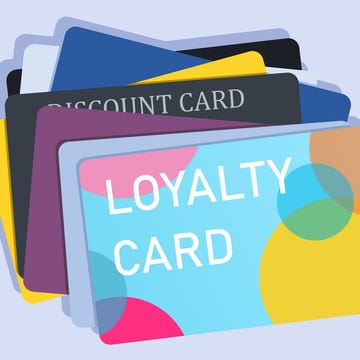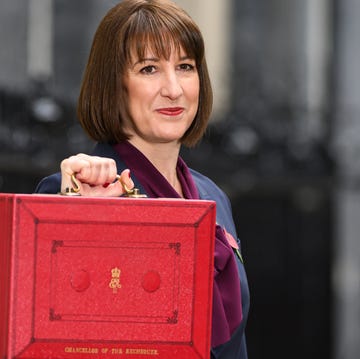Even before the all-inclusive two-week holiday to Cuba was booked, languages teacher Alison, 50, had her reservations. "My friend’s relationship had recently ended and she was keen to go away – but not on her own," she explains. "Somehow it ended up as a group of four – I guess we all wanted to help her have some fun – and my friend was the common denominator."
From the outset, Alison worried that differences in income within the group could cause friction once they got to Cuba. "My friend is a successful businesswoman and one of the group is a stay-at-home mum with a husband who works in banking, but I was reassured that another teacher was going with a similar salary to mine," says Alison.
"A holiday for me is about more than lying on the beach"
To try and head off any potential conflict over money, Alison made it clear at the time the trip was booked what her spending budget for the trip was. She’d already researched typical prices in Cuba and allocated herself a £500 spending money budget for out-of-resort trips, souvenirs and treats. She also shared with the others in the group what she likes to get out of travelling and how this shapes what she prioritises spending on. "A holiday for me is about more than just lying on the beach," she says. "I like to enjoy the local culture, traditions and customs. I wanted to be able to leave the resort and go to the places locals frequented — this is especially important as a languages teacher so I can share some of the culture with students on my return." Having set out her financial stall ahead of time, she looked forward to exploring Cuba once they got there.
However, things didn’t work out the way Alison had hoped. "From the start, there seemed to be a misunderstanding about what had been agreed and what we were all happy to contribute to financially," she says. "My friend only wanted to go to the more touristy places and the others in the group wanted to take cabs into town when we could easily walk and to eat out at expensive restaurants, whereas I preferred the local cuisine and culture. They also wanted to buy drinks for everyone and put it on our room, expecting me to contribute."
But by the end of the holiday, Alison had bust her budget by more than £250 and still missed out on many of the things she’d really wanted to do, including swimming with dolphins. "Luckily, I had worked overtime prior to the holiday so could pay off the credit card bill on my return," she adds.
"My concerns were dismissed as unimportant"
When she tried to address the group’s differing approaches to money and spending while they were away, she didn’t feel she was taken seriously. "I shared my concerns several times while we were away, but they were dismissed as unimportant or as if I was joking. It was like my friend believed we were there to entertain her and I had to remind her that this was my holiday, too. I felt angry and frustrated, but also disappointed – we were meant to be friends, after all. We totally clashed over money so badly that it ended up destroying our friendship and, unfortunately, we no longer speak."
With the holiday behind her and having had time to reflect, Alison thinks the gulf between budgets and attitudes to spending within the group might have meant the trip was doomed from the start. "Maybe my friend just had no understanding of what my lower wage meant compared to hers, but I won't go on holiday with a group anymore," she says.
In it together?
Alison’s experience isn’t uncommon. According to data from Expedia, a third of holiday-makers planned to get away with friends this year, while just over a tenth of British families have holidayed with another family in the least 12 months, research by ABTA reveals. There’s a lot to be said for getting away as a group. Sharing travel adventures can strengthen friendships, and holidaying with people you’re close to, whose company you already know you enjoy and who have similar interests, should be a recipe for success.
But it’s often around the financial implications of a shared trip that things can start to unravel. Over half (51%) of those recently surveyed by Starling Bank said they’d fallen out with a friend on holiday, and 54% of arguments were triggered by disagreements about money.
"Financial differences glare in the sunshine of holidays," observes Charlotte Fox Webber, psychotherapist and author of What We Want. "Spending money – on activities, purchases, restaurants, drinks and accommodation – is a way we often pursue pleasure, and our attitudes towards spending can be about self-expression, generosity, fairness and values. If one person wants to be frugal and another wants to splash out, it can become a clash of personalities," says Charlotte.
How to avoid money arguments on holiday
So, how do you stop your fun in the sun from ending in tears and avoid abandoning your friendship in baggage reclaim? Here are six questions to ask before you book your time away together:
1. Are you well-matched travel buddies?
Before you even follow up what seemed like a brilliant idea over post-work cocktails, ask yourself whether this friend is your ideal holiday companion. "It’s helpful to have a sense of mutual expectations. If your friend has historically let you pick up the bill and cover costs, are you prepared for this dynamic to play out on a holiday? If your friend has much more money than you, are you prepared, willing and enthusiastic about keeping up with a higher level of spending than usual?" says Charlotte Fox Webber.
2. Can you talk openly about money?
Before you anyone puts down deposits, have an open conversation with them about how much you plan to spend. "It can be helpful to say to a friend that you’re stretched and don’t want to spend a lot. You don’t have to claim poverty to get out of excessive spending. You’re allowed to honour whatever budget works for you — clarity is kindness for both sides and doesn’t have to be over-explained if you’re too uncomfortable," says Charlotte.
3. Have you done your research?
Excursions, meals and travel, drinks, ice creams, taxis… the pressure to agree to unplanned or impulse spending can be intense when holidaying as a group, especially with kids. Starling’s research shows 46% of those who travelled with friends went on excursions or took part in activities they hadn’t accounted for. Go online and check the cost of excursions so you know in advance what you can afford. "Be open with your friends about the restaurants that are within your budget," says Rachel Kerrone, Starling Bank's personal finance expert.
While it can make sense to have a holiday ‘lead’ organiser, don’t just sit back and leave everything to them unless you are prepared to accept all the decisions – financial or otherwise. Do your own research around costs. Check out Starling’s travel budget planner tool, the onthebeach cost comparison tool and Numbeo for the nitty gritty on the cost of living in different cities/countries.
4. What’s your budget?
Half of those surveyed by Starling did not create a budget before their last trip or talk to their friends about budgets.
According to research by the financial wellbeing app RiseUp, 37% of us are not comfortable discussing money matters with friends. Just saying ‘it’s out of my budget’ can make us feel exposed, embarrassed or even judged. "Yet, what most people don’t realise is that often, when someone dares to say that a gift, a trip or a restaurant is out of their budget, someone else in the group follows with ‘actually, it is for me too’," says Vicky Reynal, financial psychotherapist and author of Money on Your Mind: The Psychology Behind Your Financial Habits.
Try the loud budgeting technique. "This is where you set your individual budgets when you’re together as a group so everyone is aware of what other people are comfortable spending and can therefore take this into account. This could even include the activities that you’d like to do on a trip, so you can have a rough idea of the costs, and you can find a way for this to be affordable for everyone to enjoy," says Starling Bank’s Rachel.
Talk to your kids about how you will prioritise spending while you’re away. "You don’t have to tell them everything but nor do you need to protect them from knowing that not everyone has the same amount – you can’t control what other families do and differences have to be accepted," says Charlotte. "If you find yourself constantly indulging your kids or falling short in a way that doesn’t feel congruent, consider whether it’s about your children or if the children’s needs are really about the adult dynamics," she says.
5. How will you split the bill?
Use a money-sharing app to keep track of group expenses and help pay bills fairly. Check out Splitwise (where you create a group that you can all add bills and receipts to and keep track of who owes who) and HyperJar (where you create a ‘jar’ for shared expenses that you all pay in to and spend from – you can even send each other messages).
Cino is a new shared virtual card that automatically splits costs and deducts each group member’s bank account in real time. Anyone can connect Cino to their account, regardless of their bank (no credit checks required).
In Paypal, if you head to the payments tab, scroll down to ‘split the bill’, input the total bill and then select those to split it between, the others will then get a request for the money. Paying upfront for an activity? If you’re paying a seller directly, you can easily switch currencies when sending a person-to-person payment in the PayPal app as PayPal will calculate the conversion rate for you.
6. Would you do it again?
Finally, once you’ve got home and the dust has settled, be honest with yourself: do you want to holiday with this person or group again? If not, how can you break the friendcation cycle without giving offence? "Be intentional," says Charlotte. "If you don’t make a change, it probably won’t magically happen. Resetting a dynamic is hard in a friendship but it’s liberating and empowering to be clear."















